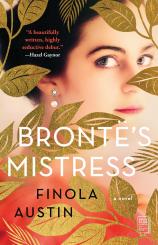Reading Group Guide
Discussion Questions
Brontë’s Mistress

1. On page 51, Lydia Robinson remarks, “How funny it is that men and women struggle as they die, but few of us kick or scream as we are lowered alive into our tombs.” How would you describe Lydia’s state of mind at the start of BRONTË’S MISTRESS?
2. What is Lydia’s relationship with her daughters like? Why do you think that she is often critical of them? On page 80, she pens, “Motherhood was about offering truth, not comfort. For all it still tugged at my heartstrings to hear her cry so, Lydia needed to leave behind her childish notions. And I must be the one to disabuse her.” Why does the elder Lydia feel that it’s her duty to do so? Do you agree with her (taking into account the historical context)?
3. Lydia feels strongly about her daughters’ marriage prospects and remarks on page 90, “I would take action and defend them from a woman’s worst fate --- to be extraneous and unneeded.” Given that this is Lydia’s greatest fear, how does this worry drive her actions and affect her decisions throughout the novel? Does she ever become “extraneous”? Do the Brontës?
4. Women throughout history are often cast as the temptress when they engage in sexual relationships outside of wedlock. What famous examples of this can you think of? How is this portrayed in BRONTË’S MISTRESS? Is more of the burden for the affair put on Lydia than it is on Branwell? Do you believe that Edmund’s emotional distance from Lydia played a role in her affair, and if so, does any of the burden fall on him?
5. A great deal of Lydia’s focus revolves around what is economically safe and savvy for herself and her family. Why do you think she engages in this affair with Branwell, given all the risks to her financial well-being and societal status?
6. On page 136, Lydia says to Anne Brontë, “You never had your chance.... And, now, look at the life you are forced to lead --- you and your sisters. You must choose between being a drudge or a burden.” Do you think Lydia is being harsh or truthful here? Are we meant to sympathize with her? Did writing novels offer a third alternative path to the Brontë sisters? Do female main characters have to act a certain way for readers to sympathize with them?
7. Why do you think Lydia is so fascinated with Charlotte?
8. How would you characterize Lydia’s relationship with Marshall? Compare Marshall to Lydia's own mother (as we're told) or to Lydia and her daughters' relationship. Do you think there is anything romantic and/or sexual in their connection?
9. Before Lydia travels to Allestree Hall, she says on page 245, “Sir Edward might be saving me, but I would not abdicate my power. I could not allow myself to make the same mistakes again.” In what way did Lydia abdicate her power in past relationships? How does she work to change that dynamic when she’s with Sir Edward? Do you think she’s successful in keeping her power?
10. Women have more options today than in Victorian times. But do you think there is still undue pressure on women in romantic, sexual or economic relationships? Do some aspects of Lydia’s experience apply to women today?
11. Consider Lydia’s relationship with Dr. Crosby. Why do you think he shares with her the fact that he’s attracted to men? How does their relationship grow over the course of the novel, and how is it unique from any of the other relationships in Lydia’s life?
12. Lydia’s affair with Branwell has been historically characterized as bringing down the entire Brontë family. Having read this novel, do you believe that to be true? Why do you think this blame has been laid at Lydia’s feet?
13. Did Lydia’s encounter with Charlotte go the way you expected it would? Lydia writes, “The tears I was choking on now seemed less for Branwell than for his sisters, for the fact that they would always hate me” (page 287). Why do you think Charlotte’s rejection of Lydia affected her so much? Do you think she feels closer to the Brontë sisters than to Branwell by this point? Why?
14. What do you think of the ending and Lydia’s “almost overwhelming desire to write a novel of my own. A story about me?” (page 297)? In what ways was her own story told for her in the past? How did her tangential relationship with the Brontë sisters inspire this? What stories of real women from the past may be lost to us?
Brontë’s Mistress
- Publication Date: June 22, 2021
- Genres: Fiction, Historical Fiction
- Paperback: 336 pages
- Publisher: Atria Books
- ISBN-10: 198213724X
- ISBN-13: 9781982137243







